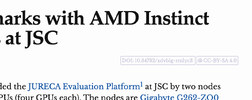Licenses are an important topic within open source. Without licenses, information or code can be publicly available but not legally available for reuse or redistribution. The open source software community’s most common licenses are the MIT license or the GNU GPLv3. When you read the MIT or GNU license, you can see they are rather specific: and They aim to cover primarily software, not other forms of information such as, for example, data.
Messaggi di Rogue Scholar
There are ongoing outbreaks of mpox globally. The Democratic Republic of Congo (DRC) is so far the worst hit with a total of 7,851 cases and 384 deaths reported between January 1 and May 26, 2024 1 . Before 2022, there were few reports of sustained mpox transmission globally.

My collaborator Daniel shared an update on his blog about our the progress of our open-source flow battery kit, so I thought I’d do the same. This was motivated by my previous post (Smith 2024). We’ve been working together with Prof Sanli Faez and Josh Hausener at Utrecht University on their FAIR Battery Project, though the repository for my cell design and jig is currently here.

Towards the end of 2022 I drafted this, consider it a work in progress - it was before I had joined forces with Daniel to form the Flow Battery Research Collective Motivation for an open-source flow battery This project aims to develop an open-source flow battery design suitable for mid-scale manufacturing by a well-equipped hackerspace or conventional machine shop.
Throughout the Epiverse project, we use the renv R package to ensure reproducibility of the training materials and the pipelines we are providing. But we sometimes get reports from users who struggle to rebuild the environment and run the code. In this post, we dissect the source of these issues, explain why in reality renv is not at fault, and how this is caused by the inherent complexity of reproducibility.

Laut der aktuellen Standortbestimmung der DINI AG FIS soll schon heute eine enge Verzahnung von Forschungsinformations- und Forschungsdatenmanagement mitgedacht werden. Dies stellt Betreiber von Forschungsinformationssystemen künftig vor weitere Herausforderungen. Diese sind beispielsweise: Importmöglichkeiten von Metadaten anhand geeigneter Identifier Erweiterung des eigenen Metadatenschemas Mappings (extern nach intern bzw.

1 This blog is an experiment. We want to share bits and pieces of our work; the reports we write, the presentations we hold, or the little discoveries we make, or even some first, water-testing investigations; and all the rest. It’s a documentation of what we do. Little bits of science, collected in the open, and sometimes even not that little.
Quick notes to self following on from a conversation about linking taxonomic names to the literature. There are different sorts of citation: Paper cites another paper Paper cites a dataset Dataset cites a paper Citation type (1) is largely a solved problem (although there are issues of the ownership and use of this data, see e.g. Zootaxa has no impact factor.
This blog post provides some background to a recent tweet where I expressed my frustration about the duplication of DOIs for the same article. I'm going to document the details here.
With the recent announcement that Hypergraph will evolve into a web publishing platform for research modules (with a new name forthcoming), Liberate Science also signed up to become a member of CrossRef. This means we'll start issuing ("minting") Digital Object Identifiers (DOIs) for research modules in the near future. A clear and long-term strategy for this is valuable, and I want to share that journey openly.